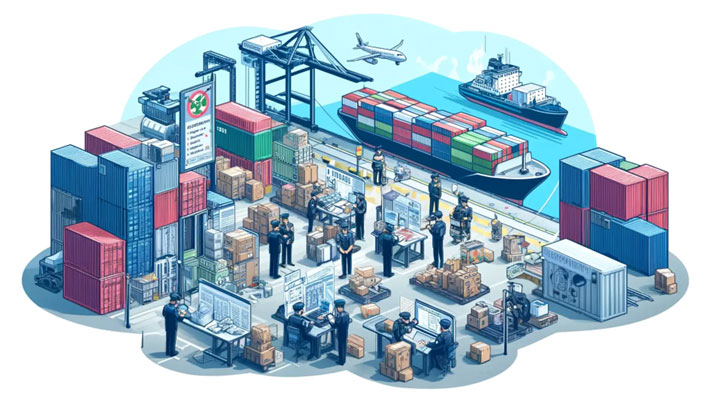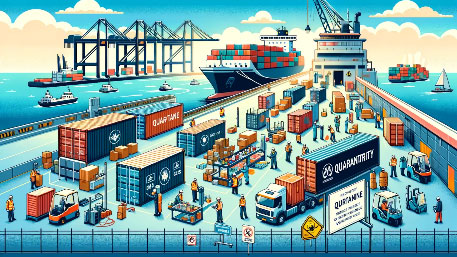
Australia’s stringent customs regulations and quarantine laws present challenges and opportunities for international shippers. Navigating these regulations is crucial for ensuring smooth customs clearance, avoiding delays, and mitigating penalties.
In this article, we will delve into the complexities of Australian customs regulations, duties, and taxes, highlighting the importance of compliance and how our international freight forwarding services can simplify this process.
The Framework of Australian Customs and Quarantine Regulations
Australia’s customs regulations are about keeping the country safe and protecting our borders, economy, and unique biodiversity. The Australian Border Force (ABF) is the main agency ensuring these rules are followed. It ensures that everything coming into Australia meets our laws, which include stringent biosecurity measures to effectively stop pests and diseases from entering.
Two critical pieces of legislation guide these efforts: the Customs Act 1901 and the Biosecurity Act 2015. These laws outline what importers need to do, like providing accurate documentation, using the correct tariff classifications, and following import restrictions and quarantine measures. The Department of Agriculture, Fisheries and Forestry (DAFF) also plays a big role in managing biosecurity risks, ensuring everything runs smoothly and safely.
Key Components of Customs Regulations
Documentation Requirements
Getting your paperwork right is crucial for customs clearance. This process involves making sure all necessary documents are accurate and complete. Key documents include commercial invoices detailing the value and nature of the goods, packing lists describing the items in each package, bills of lading serving as the shipment receipt, and certificates of origin verifying where the goods were produced. Mistakes or missing documents can cause significant delays and extra costs.
The Australian Border Force documentation guide provides a comprehensive overview of what’s needed and how to get it right. Following these guidelines helps importers avoid common pitfalls and ensures a smoother customs clearance process.
Tariff Classification
Every item coming into Australia needs the correct Harmonized System (HS) code. This code decides the customs duty and taxes you’ll pay on your goods. The HS code system is internationally standardised, but picking the right code can be tricky. Misclassification can lead to penalties, delays, and extra costs.
The Department of Home Affairs offers a tariff classification tool to help importers find the right HS code for their goods. This tool simplifies the process with detailed descriptions and examples, helping importers accurately classify their products and avoid potential issues during customs clearance.
Customs Duties and Taxes
Australia charges customs duties and the Goods and Services Tax (GST) on imported goods. The rates of these duties and taxes depend on the type of goods and their country of origin. Some items might also have additional taxes, like excise duties on alcohol and tobacco. Importers need to understand these rates and accurately calculate the total cost of importing their goods.
The Australian Border Force provides detailed information on duty rates and GST calculations, helping importers prepare for the financial aspects of bringing goods into Australia. Getting these calculations right is crucial for compliance and to avoid penalties or delays.
Import Restrictions and Prohibitions
Some items are restricted or completely banned from being imported into Australia. These include hazardous materials, endangered species, and products that don’t meet Australian safety standards. Importers need to be fully aware of these restrictions to ensure compliance and avoid severe penalties.
For instance, hazardous materials require special permits and handling procedures, while products that don’t meet safety standards might need modifications or certifications before importation. Staying informed and following these rules helps importers prevent disruptions and ensure their goods are allowed entry into Australia.
Specific Examples of Australian Customs Laws
Banned and Restricted Imports
Australia has a list of items that are either banned or come with restrictions. For example, firearms and weapons are tightly regulated. To import them, you need to follow strict licensing and permit requirements. You can find a complete list of prohibited goods here.
Chemical and Hazardous Substances
Bringing chemicals and hazardous substances into Australia involves stringent controls to ensure safety and environmental protection. Importers must adhere to the Australian Inventory of Chemical Substances (AICS) guidelines and might need permits from the Department of Agriculture, Water and the Environment. More information is available on the Australian Industrial Chemicals Introduction Scheme (AICIS) website.
Biosecurity Requirements for Food Products
All food products entering Australia must meet biosecurity standards to prevent pests and diseases. For instance, meat and dairy products face strict quarantine controls and must have detailed health certificates. Comprehensive guidelines on biosecurity requirements for food products can be found on the DAFF website.
Electronic Products and Safety Standards
Electronic products must comply with specific safety standards before they can be imported and sold in Australia. These standards include following the Electrical Equipment Safety System (EESS) and obtaining the necessary certifications.

Key Components of Quarantine and Biosecurity Measures
Import Permits
Certain goods, such as live animals, plants, and specific food products, require an import permit before entering Australia. The process starts with the importer submitting an application to DAFF well before the shipment date. This application must include detailed information about the goods, their origin, and their intended use in Australia.
Once submitted, DAFF reviews the application to ensure that the goods comply with Australian biosecurity standards. If approved, the permit will outline any specific conditions that must be met during shipping and upon arrival.
Biosecurity Treatments
Depending on the type of goods, certain biosecurity treatments might be necessary to prevent the introduction of pests and diseases into Australia. These treatments include fumigation, heat treatment, or irradiation. For example, wooden products often require fumigation to eliminate insects, while some foods might need irradiation to kill bacteria.
These treatments must be performed by providers that are approved and certified by DAFF to ensure they meet Australian biosecurity standards. Importers should arrange for these treatments before shipping the goods to avoid delays at the border.
Inspections and Quarantine
When goods arrive in Australia, they are subject to inspection by biosecurity officers to ensure they comply with import conditions. The inspection process can include physical examinations, sampling, and laboratory testing. For instance, a shipment of fresh produce might be physically inspected for signs of pests, and samples could be taken for further testing. If the goods do not meet the required standards, they may be placed in quarantine, where they can undergo additional treatments. In some cases, non-compliant goods may be destroyed to prevent biosecurity risks.
Examples of Australian Quarantine and Biosecurity Laws
Importation of Live Animals
Bringing live animals into Australia is tightly controlled to prevent diseases. Importers must meet strict health certification and quarantine requirements. For example, dogs and cats must undergo specific pre-export preparations and quarantine upon arrival. This process ensures they are free from diseases that could affect Australia’s animal population.
Plant Import Regulations
Importing plants and plant products into Australia involves adhering to specific biosecurity measures to keep pests at bay. These measures include treatments like fumigation or heat treatment and securing necessary import permits to help protect Australia’s unique flora from harmful pests and diseases.
Wood and Timber Products
Wood and timber products must comply with strict biosecurity regulations to prevent timber pests from entering Australia. This typically involves treatments such as methyl bromide fumigation or heat treatment. Ensuring these products meet biosecurity standards is crucial to avoid penalties and ensure safe importation.
Food Safety Standards
Imported food must comply with Australia’s rigorous food safety standards, ensuring the food is free from contaminants and meets labelling requirements. For instance, seafood imports must adhere to the Imported Food Control Act 1992, ensuring they are safe for consumption. Information on food safety standards can be found on the Food Standards Australia New Zealand (FSANZ) website.

The Role of a Freight Forwarder in Ensuring Compliance
A knowledgeable freight forwarder is essential for navigating the complexities of Australian customs and quarantine laws. Here’s how they help ensure smooth customs clearance:
- Expertise in Regulations: Freight forwarders have a deep understanding of customs and quarantine rules. They guide you through the necessary documentation, tariff classifications, and compliance requirements, minimising the risk of errors and delays.
- Efficient Documentation Handling: They manage the preparation and submission of all required documents, ensuring everything is accurate and complete. This reduces the chances of delays caused by paperwork issues.
- Customs Brokerage Services: Many freight forwarders offer customs brokerage services, acting as intermediaries between importers and customs authorities. They handle the entire customs clearance process, including paying duties and taxes, on your behalf.
- Biosecurity Compliance: Freight forwarders help with biosecurity requirements by arranging necessary treatments, inspections, and permits. Their expertise ensures your goods meet all biosecurity standards, avoiding costly delays and penalties.
- Real-Time Tracking and Updates: Advanced tracking systems used by freight forwarders provide real-time updates on your shipment’s status. This transparency keeps you informed and helps address any issues promptly.
Partnering with a freight forwarder simplifies the complex process of customs and quarantine compliance, ensuring your goods clear customs smoothly and efficiently.
Ensure Smooth Customs Clearance with Jacanna’s Expertise
Navigating the complexities of Australian customs and quarantine laws requires a solid understanding of the regulations and meticulous attention to detail. Compliance is crucial for avoiding delays and penalties and ensuring the smooth flow of goods across borders. Partnering with a knowledgeable freight forwarder like Jacanna can significantly streamline the customs clearance process, offering valuable expertise and support.
Contact Jacanna today for international freight forwarding excellence.